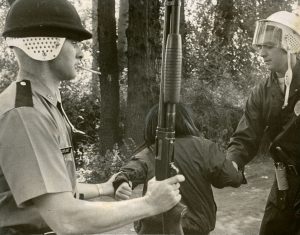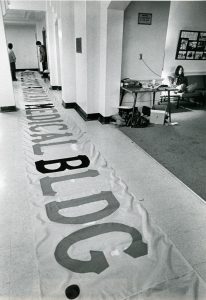In the summer of 1970, Ramona Bennett and a group of activists set up a fishing camp on the banks of the Puyallup River between Tacoma and Fife. This location was selected for its high visibility and Ramona, armed with a portable typewriter, kept news reporters informed as a way to raise awareness. The group had gathered in response to the violations of Native fishing rights. Such “Fish-Ins” had been occurring since around 1963 and had drawn national attention to the topic of Native sovereignty in the Pacific Northwest.
The makeshift camp began to expand with Tribal leaders and activists joining from other states to stand in solidarity with the Puyallup people. As the camp grew, local officers responded. The camp was destroyed and dozens of people, including Bennett, were arrested. “I had a portable, manual typewriter,” said Bennett in an oral history she recorded at Tacoma Public Library in 2022 “That’s what I had to write on. And when we were raided...they bulldozed everything, including my little typewriter and including my little tape player and it was all my pow wow music, my Native American church music, all my Al Green. They just bulldozed everything: teepees, clothes, personal effects.” Her attempts to raise awareness were successful and the Tacoma Fish-In drew national attention. Eventually, federal legal action would reaffirm the fishing rights of tribes in Washington.
But Ramona’s work was not finished. In 1976, Bennett, who was now Chairwoman of the Puyallup Tribe, led the takeover of the Cascadia Center. Cascadia, previously the Cushman Indian Hospital, had been relinquished by the Tribe to the federal government in exchange for guaranteed health and education services for Tribal members. But the hospital was sold to the state and converted to other purposes including a detention center for youth.
On October 23, 1976, Bennett and a group of Puyallup leaders along with Tribal police served an eviction notice, seized the switchboard, and assumed control of the building. Over the next seven days, they arranged the transfer of the young people being detained at Cascadia. A giant yellow banner was hung outside the building, visible from the freeway, reading "CLIMB! Chief Leschi Indian Medical Building." Support for the Puyallup cause poured in from across the country. The state attempted to negotiate privately, but Bennett insisted that the discussions take place in the main floor lounge in front of tribal members and the media. The occupation led to immediate concessions and laid the groundwork for the Puyallup Tribe to eventually negotiate an expansive land claims settlement in 1990.
The Northwest Room holds many items related to Ramona Bennett, the Fish Wars, and the takeover of the Cascadia building including:
A video recording of Ramona Bennett from the WILLO Storytelling Festival, opens a new window
Interviews with Ramona Bennett conducted by Reverend David Alger, opens a new window
Photographs of Ramona Bennett from the Tacoma News Tribune Photograph Files, opens a new window
Photographs of Cascadia/Cushman from the Tacoma News Tribune Photograph Files, opens a new window
Puyallup Land Claims Settlement Records, opens a new window
Sources:
Ainscough, Margaret, "Puyallup Tribe hits stride with an 'avid-reader' leader," Tacoma News Tribune, July 4, 1976.
Pugnetti, Jerry, "Gas, Clubs Rout Indian Fishermen; Bullets Fly But Net Is Seized," Tacoma News Tribune, September 9, 1970.
MacNey, Malcolm, "Indian Fishing Injunction Sought," Tacoma News Tribune, September 18, 1970.
Palithorp, Bellamy, "The standoff at this Pierce County bridge 50 years ago codified tribal treaty fishing rights," KNKX, December 29, 2020.
Deadrick, Sam, "Puyallup evicts State from tribal property," Freedom Socialist Party, Fall 1976.
"Clara Fraser Interviews Ramona Bennett," Freedom Socialist Party, Fall 1976.
Lane, Bob, "Sunday hectic but peaceful at Cascadia," Tacoma News Tribune, October 25, 1976.
Bailey, John and Carl Lizberg, "Puyallup Indian seize Cascadia Center," Tacoma News Tribune, October 24, 1976.




